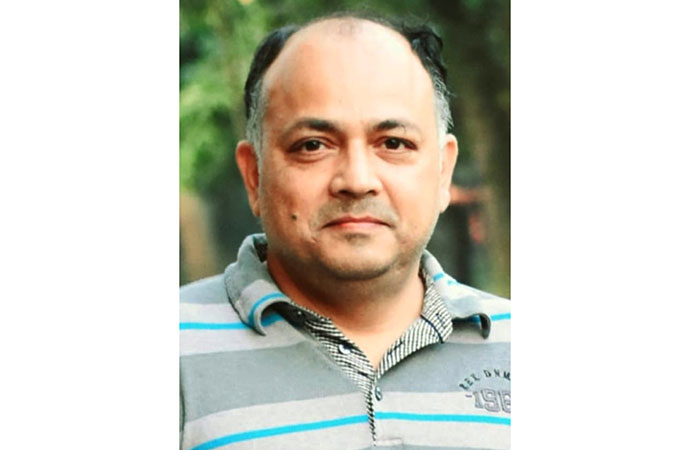Culture

Khwaja Haider
Ghazal. A lyrical form rooted in Arabic poetry, traditionally centres on themes of love, both earthly and spiritual that conveys the duality of longing and fulfilment, often portraying the anguish of separation from the beloved alongside the enduring beauty and power of love itself. In a quiet corner of contemporary Bengali music, the soulful strains of ghazal - still a popular genre among listeners here - are steadily finding a voice, through the lyrics of many talented individuals. Among them is Khwaja Haider, a lyricist whose devotion to the form is as much spiritual as it is artistic.
In an exclusive conversation with Dhaka Courier, Khwaja Haider opened up about his journey, his philosophy, and his dreams for Bengali ghazal.
From Persia to Bengal: Bangla Ghazal's journey through time
Ghazal, Khwaja explains, has a rich history stretching from Persian and Urdu literature to the Indian subcontinent. "It became popular in the Mughal era due to the influence of the Persian language and culture," he notes. Over time, ghazal established itself as a powerful medium in Urdu literature, reaching homes across generations through the voices of Mehdi Hassan, Ghulam Ali, and Jagjit Singh. In Bengal, it has arrived more gradually, and its practice remains relatively niche. Yet, in Bengali, ghazal is carving a distinct path-blending religious sentiment, spirituality, and human values.
Khwaja's own encounter with ghazal began in childhood. "In our family, religious gatherings were regular, and I started writing a few verses centred on the life and teachings of Allah and the Prophet (peace be upon him). It was very basic at first, but it laid the foundation for my later journey." His formal foray into ghazal came only a couple of years ago when he wrote a piece for an Eid Milad-un-Nabi celebration. "That composition led me to the path of ghazal, and since then, I have been writing regularly," he recalls.
Interestingly, Khwaja composes without any instrumental accompaniment. "The true beauty of a ghazal lies in its words and the emotion of its melody. If the lyrics touch the heart and the tune is harmonious, the ghazal can move people even without the accompaniment of instruments. For me, ghazal is not just art; it is devotion, love, and a deep expression of the soul."
A soulful medium
When asked why he chose ghazal over other musical forms, Khwaja told Dhaka Courier, "Ghazal allows direct dialogue with the soul. Each line conveys deep feelings that resonate with others." He believes that if people understand the guidance given by Allah and the Prophet (peace be upon him), their lives become simpler and more peaceful. Yet, religious teachings can sometimes appear complex to the ordinary person. "Through ghazal's simple, melodic language, I want these lessons to reach people in a way that inspires reflection and transformation," he says.
Khwaja draws inspiration from Kazi Nazrul Islam, whose Islamic ghazals have guided and inspired generations. He believes ghazal is more than music - it is a form of dawah, a spiritual message. "If even a single listener finds inspiration to walk the right path, that is my greatest success. Through this change, everyone can seek forgiveness in Allah's court together," he adds.
Khwaja has penned nearly a hundred ghazals, ranging from praise of Allah to admiration of the Prophet (peace be upon him). Collaborating with eminent composers and performers, his work has gained wider reach. Legendary music director Sheikh Sadi Khan has composed tunes for 31 of his ghazals, with 15 more awaiting composition. Earlier, Tipu Sultan Babar had composed several, many of which are now available on Khwaja's YouTube channel and Facebook page, where 41 ghazals have been published. Notable vocalists, including BTV artists Abul Bashar Shikdar, Karim Hasan Khan, and Swapnil Rajib, have lent their voices to his compositions.
His ghazals are available on YouTube under 'Khwaja Siraj Hujur' and on the Facebook page 'Alokito Manush Hazrat Khwaja Sirajul Haq'. "One ghazal has also been recorded for broadcast on BTV," Khwaja told Dhaka Courier.
"Though it is still practised on a limited scale, interest is growing. Ghazal is not mere entertainment; it is a unique way to express the heart, especially when it carries spiritual, moral, and humanistic messages. If nurtured correctly with beautiful writing, heartfelt melodies, and sincere performance, Bangla ghazals can occupy a significant place. If young musicians embrace this form and spread the teachings of Allah and the Prophet through ghazal, it can bring positive change to society," he asserts.
Dreams and aspirations
Khwaja Haider's dream extends beyond personal recognition. "I want Bengali ghazal to become a strong tradition. My ghazals should illuminate lives, inspire reflection, and motivate positive change. One day, I hope major artists will sing my ghazals, they will feature on albums, and reach audiences via television, radio, and online platforms; but more importantly, I want the message of faith to reach hearts, allowing people to experience the teachings of Allah and the Prophet in a new light."
A composer's perspective: Sheikh Sadi Khan
Dhaka Courier also spoke with Sheikh Sadi Khan, the Ekushey Padak-winning veteran composer and a tremendous companion behind many of Khwaja Haider's lyrical creations. Reflecting on his collaboration with Khwaja, Sheikh Sadi Khan says, "Working with Haider has been inspiring. He is a diligent, passionate writer with a deep love for ghazal. With consistent practice and focus, I believe he can become even more accomplished."
"Ghazal is not merely a musical form; it expresses the deepest feelings of the soul. Its language and melody touch the heart. If the words are moving and the tune sweet, no instrument is needed for the ghazal to make a place in people's hearts," he says.
Sheikh Sadi Khan emphasises the role of institutions and cultural bodies in nurturing ghazal. "Though Bengali ghazal is practised on a limited scale, its potential is immense. Government initiatives, workshops, festivals, and the efforts of cultural organizations and artists are essential to popularize it," he notes.
Regarding young music artists, and passionate lyricists like Khwaja Haider - the veteran composer encourages experimentation and diversity. "Ghazal can transcend generations and social boundaries. Emerging artists should enrich it with fresh ideas, themes, and styles-not just spirituality or love, but social consciousness, humanity, and contemporary issues. This will make ghazal lively and relevant," according to Sheikh Sadi Khan.
With the support of mentors like Sheikh Sadi Khan and the rising interest of audiences and young musicians, Bengali ghazal may soon emerge from its niche to take a prominent place in the country's cultural landscape. For Khwaja Haider, the ultimate measure of success is not fame, but the spark of reflection and spiritual awakening that his words can ignite in the hearts of listeners. In the melodic silence between verses and refrains, Bengali ghazal whispers timeless truths - an art form, a message, and above all, a calling to the soul.

























Leave a Comment
Recent Posts
Religion and Politics: A Toxic ...
At Dhaka University, cafeteria workers have been told not to wear shor ...
Enayetullah Khan joins AsiaNet ...
AsiaNet’s annual board meeting and forum was held in Singapore, ...
In a New York minute
Many leaders back a UN call to address challenges to ..
Defaulted loans at Non-Bank Financial Institutions ( ..
How the late Zubeen Garg embodied cultural affinitie ..